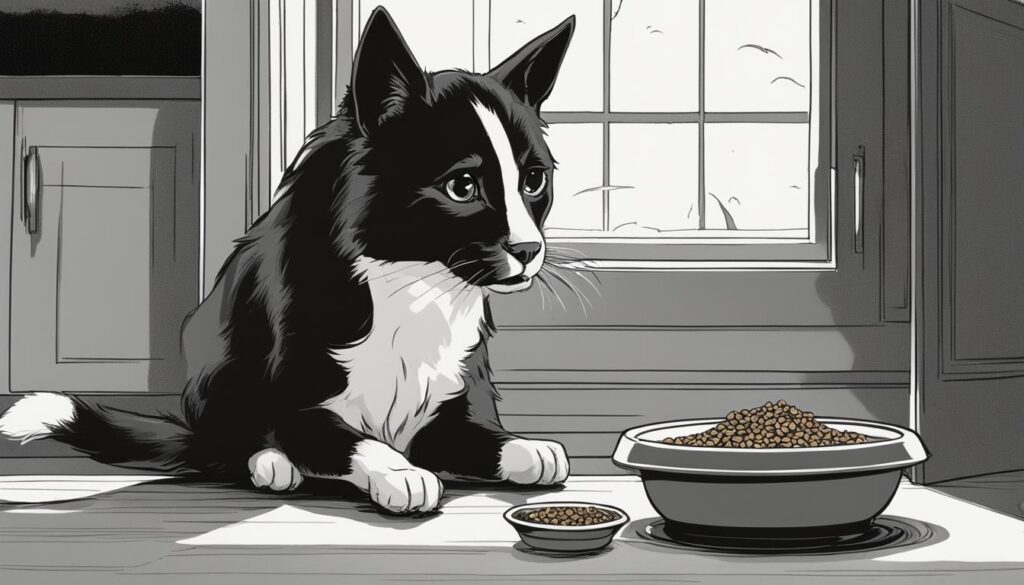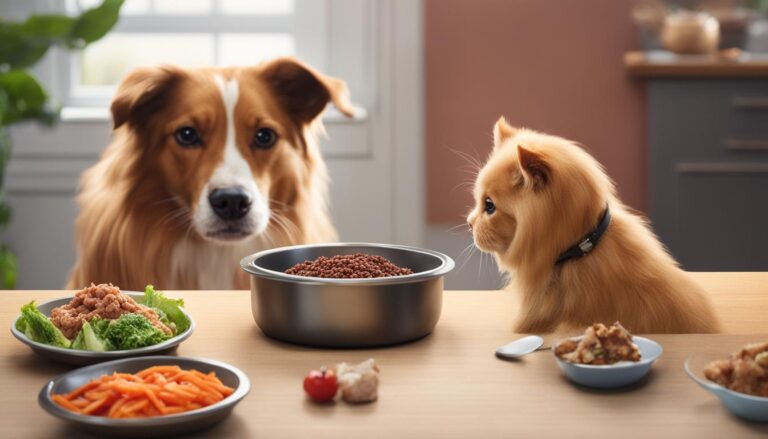Have you ever wondered if it’s safe to feed your feline friend some dog food? While it may be tempting to share your pup’s meals with your cat, it’s important to understand the differences between cat food and dog food. Cats and dogs have distinct nutritional needs, digestive systems, and physiological makeups.
https://www.youtube.com/watch?v=TuvqP-rVAI0
Основные выводы:
- Cats require more animal protein than dogs.
- Cat digestive systems cannot handle the carbohydrates typically found in dog food.
- Feeding cats dog food can lead to imbalanced nutrition and digestive issues.
- Cats need specific essential amino acids like taurine, which are not found in sufficient quantities in dog food.
- Some ingredients in dog food can be toxic to cats.
Why Can’t I Feed My Cat Dog Food?
Cats have unique nutritional needs that differ from dogs, making it important to provide them with a diet specifically formulated for felines. While it may be tempting to feed your cat dog food, it is not recommended as it can lead to imbalanced nutrition and health problems.
Cats are obligate carnivores, meaning they require a higher amount of animal protein in their diet compared to dogs. Dog food does not provide the necessary levels of protein and fat that cats need to thrive. Feeding cats dog food can result in nutrient deficiencies and digestive issues.
Cat digestive systems are also not equipped to properly break down the carbohydrates typically found in dog food. This can lead to digestive upset and imbalanced nutrition. Long-term consumption of dog food by cats can even result in serious health consequences such as liver disease, diabetes, and food intolerances.
Why Can’t I Feed My Cat Dog Food?
| Кошки | Dogs |
|---|---|
| Require higher levels of animal protein | Can tolerate lower levels of animal protein |
| Cannot properly digest carbohydrates | Can digest carbohydrates more efficiently |
| Need specific essential amino acids like taurine | Can produce certain essential amino acids on their own |
Feeding cats dog food can lead to imbalanced diets, digestive issues, and long-term health problems.
It is crucial to choose cat food that meets the specific nutritional needs of your feline companion. Look for cat food that contains high-quality animal protein, essential amino acids like taurine, and is free from harmful ingredients such as onions, garlic, and certain chemicals.
Remember, a balanced and nutritious diet plays a vital role in keeping your cat healthy and happy. Consult with your veterinarian to ensure you are providing the best diet for your feline friend and avoid feeding them dog food, which is not suitable for their unique dietary requirements.
Certain Ingredients Could Poison Them
Feeding cats dog food can be harmful due to certain ingredients that are toxic to felines. It is important to be aware of these ingredients and ensure that your cat’s diet is free of them. Some common ingredients found in dog food, such as onions, leeks, garlic, and certain chemicals like propylene glycol, can be harmful to cats if ingested. These ingredients can cause damage to a cat’s red blood cells or lead to other serious health issues.
“Onions, leeks, and garlic contain compounds that can cause anemia in cats. Propylene glycol, a common ingredient in dog food, can be toxic to cats and can cause central nervous system depression. It’s crucial to avoid giving dog food or treats that contain these harmful ingredients to your cats,” advises Dr. Smith, a veterinarian.
In addition to toxic ingredients, dog treats often have higher levels of carbohydrates compared to cat treats. This can lead to weight gain and digestive issues in cats. It is vital to choose treats specifically formulated for cats to ensure their optimal health and well-being.
Cat-Friendly Treats vs. Dog Treats
| Cat-Friendly Treats | Dog Treats | |
|---|---|---|
| Protein Content | High in animal protein to meet feline nutritional needs | Varying levels of animal and plant-based protein |
| Carbohydrate Content | Low, to prevent weight gain and digestive issues | Higher, which may lead to weight gain and digestive issues in cats |
| Ingredient Safety | Formulated with safe ingredients for cats | May contain toxic ingredients for cats, such as onions or propylene glycol |
As shown in the table above, cat-friendly treats are specifically designed to meet the unique nutritional needs of cats and ensure their safety. Avoid giving your cat dog treats, as they are not suitable for feline consumption. Opt for treats that are made with high-quality ingredients and meet the specific nutritional requirements of your cat.

Remember, when it comes to feeding your cat, it’s essential to prioritize their health and well-being. Avoid feeding them dog food or treats and choose cat-specific options that meet their unique nutritional needs.
Заключение
Feeding cats dog food is not recommended. Cats have unique nutritional needs and digestive systems that differ from dogs. They require more animal protein and specific essential amino acids that can only be obtained from meat-based sources. Dog food does not provide the necessary nutrition for cats, which can lead to imbalanced diets and long-term health problems.
When cats are fed dog food, it can result in digestive issues and imbalanced nutrition. Their digestive systems are not equipped to properly break down the carbohydrates commonly found in dog food. This can lead to serious health consequences, including liver disease, diabetes, and food intolerances.
To ensure the optimal health and well-being of your cat, it is essential to choose cat food that meets their specific nutritional needs. Cat food is specially formulated to provide the right balance of animal protein, essential amino acids, and other nutrients that cats require. By selecting cat food over dog food, you can help prevent potential health risks and support your cat’s overall wellness.




